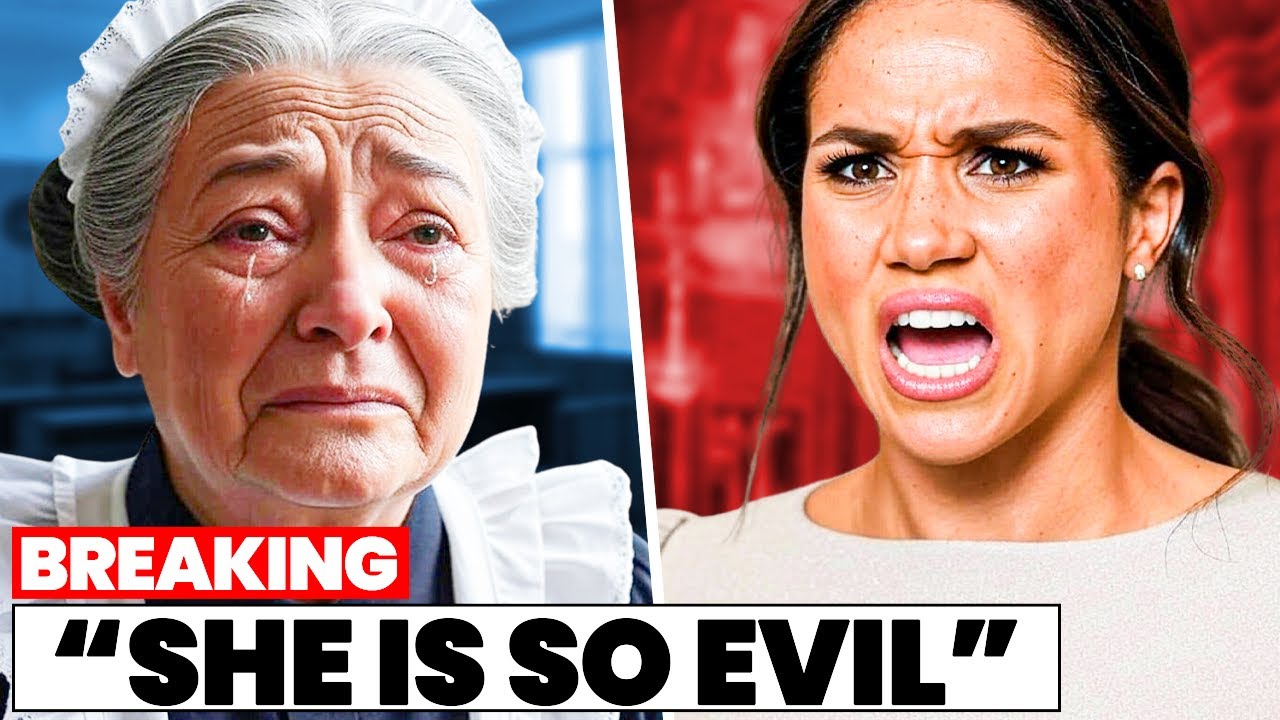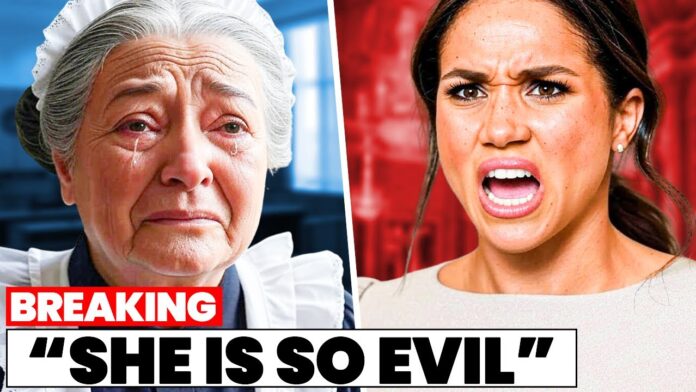SHOCKING Royal Secrets Unveiled! 😱 Did Meghan Markle’s ‘impossible demands’ drive THREE nannies away in just SIX weeks? 🤔 What’s really happening behind the scenes at the Sussex household? Tap to uncover the jaw-dropping details! 👑💥

In the ever-churning world of royal gossip, few stories capture public attention like those involving Meghan Markle, the Duchess of Sussex. A recent headline claiming that Meghan’s “impossible demands” led to the departure of three nannies in just six weeks has reignited debates about her personality and management style. This narrative, first reported in 2019 and resurfacing in various forms since, paints a picture of a demanding and controlling figure, allegedly creating chaos in her household. But how much of this story holds up under scrutiny? This article dives into the details, exploring the origins of these claims, the context of the Sussexes’ nanny challenges, and the broader implications of such media narratives, all while critically examining the sources and motivations behind them.
The Nanny Turnover Story: What We Know
The claim that Meghan Markle and Prince Harry cycled through three nannies in six weeks for their son, Archie Harrison Mountbatten-Windsor, born on May 6, 2019, first emerged in media reports shortly after his birth. According to outlets like The Sun and Express.co.uk, the couple’s high nanny turnover raised eyebrows, with sources attributing it to Meghan’s allegedly overprotective nature and exacting standards. One report suggested that Meghan was so protective that she refused to let nannies be alone with Archie, leading to tensions that prompted resignations. Another account claimed a nanny was fired after an “unprofessional” incident, though details remained vague.
By August 2019, reports confirmed the couple had hired a third nanny, described as a professional who “fit into the family well” and was accompanying them on a trip to southern Africa. Sources emphasized that choosing a nanny was a “deeply personal” decision, with different needs arising at various stages of Archie’s early life. For instance, the first nanny was reportedly a night nurse, a common temporary hire for newborns, suggesting that not all departures were due to conflict.
Fast forward to 2025, Meghan revealed on The Jamie Kern Lima Show podcast that she and Harry have employed a nanny for five years, assisting with Archie and their daughter, Princess Lilibet. This nanny, described as “amazing,” helps with school runs and daily routines, indicating a stable childcare arrangement since at least 2020. This revelation contrasts sharply with the earlier narrative of turmoil, raising questions about the accuracy of the “impossible demands” story.
Analyzing the “Impossible Demands” Narrative
The “impossible demands” label has been a recurring theme in media coverage of Meghan, extending beyond childcare to her professional endeavors. For example, a 2022 dispute with former British Vogue editor Edward Enninful over a proposed magazine cover reportedly stemmed from Meghan’s request for control over creative elements like the photographer, writer, and final edit. Sources claimed she sought a “global cover” for both UK and US editions, a privilege rarely granted, even to major celebrities like Beyoncé. When these demands were unmet, the collaboration fell apart, fueling the “Duchess Difficult” moniker.
However, these stories often rely on anonymous sources and lack concrete evidence, making it difficult to separate fact from embellishment. The nanny narrative, in particular, appears to have been amplified by tabloids eager to portray Meghan as overly controlling. For instance, PopCulture.com cited a source claiming Meghan’s protectiveness caused a nanny to quit after two weeks, yet no specific incidents were detailed. Similarly, Practical Parenting Australia suggested Meghan’s refusal to accept help, even from her mother, Doria Ragland, contributed to the turmoil.
Critics argue that such reports reflect a broader pattern of media bias against Meghan, often portraying her as demanding or difficult to work with. A 2025 Vanity Fair profile described her as alternating between “warm and effusive” and “cold and withholding” toward staff, echoing earlier claims about her sending emails at odd hours or clashing over minor details like clothing choices. Yet, these accounts are countered by positive reports, such as a 2024 X post from @according2_taz, which quoted Archewell staff praising Meghan and Harry as “dedicated” and supportive employers who foster a nurturing work environment.
Contextualizing Nanny Turnover
High nanny turnover is not unique to the Sussexes. New parents, especially those in the public eye, often face challenges finding the right fit for childcare. A source cited in Business Insider noted that the Sussexes’ rigorous hiring process, including extensive non-disclosure agreements, reflects their protectiveness over Archie’s privacy and safety. This caution is understandable given the intense media scrutiny they face. The couple’s decision to forgo traditional royal nannies, like those trained at Norland College (used by Prince William and Kate Middleton), in favor of an American nanny or even a male candidate, suggests a desire to break from royal protocol and align with their values.
Moreover, the claim of three nannies in six weeks may be less dramatic than it appears. The first nanny was a temporary night nurse, a role typically short-term. The second was let go after an unspecified incident, and the third was hired as a longer-term solution. Royal expert Russell Myers, speaking on Lorraine in 2019, described this as a normal part of the hiring process, with agencies trialing staff to find the right match. This perspective aligns with the couple’s stated goal of taking their time to ensure the best fit for their family.
The Role of Media and Public Perception
The “impossible demands” narrative fits into a larger pattern of media portrayals that often cast Meghan as a divisive figure. Since her marriage to Prince Harry in 2018, she has been scrutinized for everything from her parenting choices to her professional ventures. Reports of staff departures, including private secretaries and personal assistants, have been used to reinforce the “Duchess Difficult” label. For example, Express.co.uk reported in 2019 that staff resignations were linked to Meghan’s demanding work style, with one source claiming she shouted at a staffer over a clothing suggestion. Yet, these stories often lack corroboration and rely on sensationalized language to drive clicks.
The resurfacing of the nanny story in 2025, alongside claims about her Vogue fallout, suggests a persistent media appetite for negative narratives about Meghan. A Daily Mail article from April 2025 highlighted the contrast between Meghan’s public image as a relatable working mother and her reliance on a nanny, with critics like Bronte Coy arguing that her complaints about motherhood’s challenges seem “grating” given her privileged circumstances. This critique ignores the universal difficulties of parenting, regardless of socioeconomic status, and underscores the double standard often applied to Meghan.
Meghan’s Perspective and Response
Meghan has rarely addressed these allegations directly, but her comments on The Jamie Kern Lima Show provide insight into her approach to motherhood and household management. She described a typical morning routine, including preparing lunchboxes and writing notes for her children, emphasizing her hands-on parenting style. Her acknowledgment of a long-term nanny suggests a stable and positive working relationship, contradicting earlier reports of chaos. Additionally, Meghan’s focus on her children’s privacy, as noted in a 2025 Express.co.uk article about her selective sharing of their photos on social media, reflects a deliberate effort to shield them from public scrutiny.
In her professional life, Meghan has faced similar criticism for her assertiveness. The Vogue dispute, for instance, highlights her ambition to control her public image, a trait that can be interpreted as either demanding or strategic. Her decision to guest-edit British Vogue’s 2019 “Forces for Change” issue rather than appear on the cover shows her prioritizing substance over vanity, a choice that contrasts with the narrative of her seeking excessive control.
Broader Implications
The “impossible demands” narrative raises questions about how powerful women, particularly women of color, are portrayed in the media. Meghan, as a biracial American who transitioned from actress to royal to independent entrepreneur, challenges traditional expectations of deference and compliance. Her assertiveness, whether in hiring nannies or negotiating media projects, is often framed as problematic, while similar behavior from others might be seen as confident or decisive. This double standard is evident in comparisons to other celebrities, like Adele, who faced no such backlash for securing a dual Vogue cover.
Furthermore, the nanny story reflects the challenges of parenting under public scrutiny. The Sussexes’ efforts to protect their children’s privacy while maintaining a public presence are complicated by media narratives that amplify any perceived misstep. The secrecy surrounding their nanny hiring, including NDAs, is a pragmatic response to this reality, yet it’s spun as evidence of paranoia or control.
Conclusion
The claim that Meghan Markle’s “impossible demands” led to three nannies leaving in six weeks is a compelling headline but lacks substantial evidence when examined closely. While the Sussexes did experience nanny turnover in 2019, the reasons appear more nuanced than tabloid reports suggest, involving normal trial-and-error in hiring and a protective approach to their newborn. Meghan’s later comments about her long-term nanny and hands-on parenting style further challenge the narrative of chaos. The persistence of this story, alongside similar claims about her professional demands, points to a broader media tendency to cast Meghan as difficult, often without sufficient proof.
Ultimately, the “impossible demands” narrative reveals more about public and media expectations than about Meghan herself. As she and Harry navigate their post-royal lives, balancing privacy, parenthood, and public ventures, the scrutiny they face underscores the challenges of maintaining authenticity in the face of relentless criticism. For those intrigued by the Sussexes’ story, the truth likely lies in a gray area—neither the saintly image their supporters champion nor the villainous caricature their critics promote. To learn more about the Sussexes’ journey, check out credible sources and consider the context behind the headlines.
